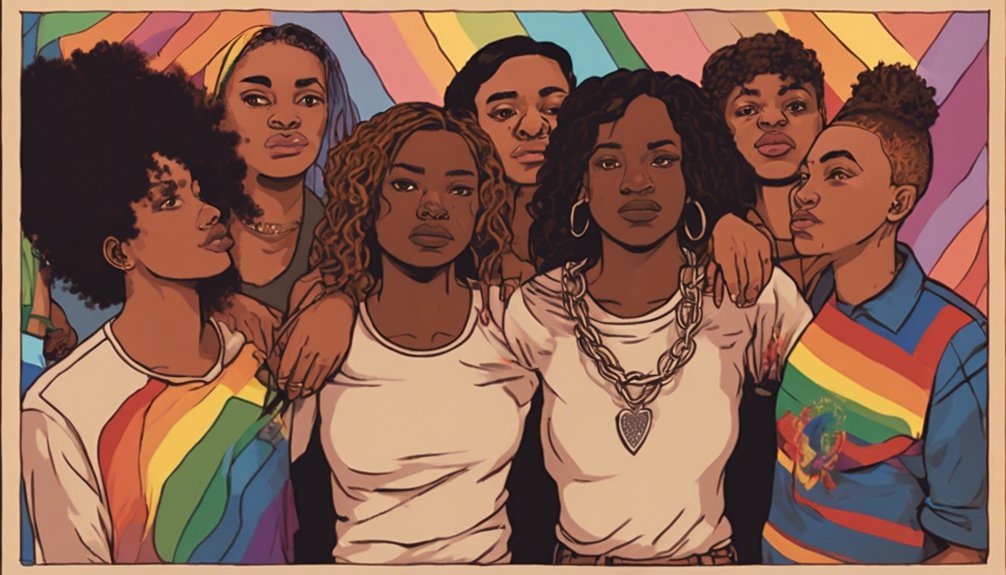
Confronting erasure and resilience, explore how trans lives navigate unprecedented challenges in the Trump era. What does the future hold?
Table of Contents
ToggleImagine over 670 anti-trans bills in just one year, 2024, reflecting the intense political climate against trans rights. You may question how such policies affect everyday lives. They’re not just lines on paper; they erase identities, limit healthcare, and increase fear. As you consider this landscape, think about the resilience and activism that continue to rise in response. There’s more to uncover about these challenges and the fight for dignity and equality.
Key Insights
- The Trump administration’s policies significantly challenged trans rights through executive orders and anti-trans bills.
- Narrow definitions of “gender ideology” under Trump fueled discrimination and restricted trans people’s recognition and rights.
- Trans individuals faced increased vulnerability to discrimination and violence due to restrictive government policies.
- Legal challenges, like those by the ACLU, were crucial in fighting the erasure of transgender identities.
- Activism and community support grew in response to anti-trans legislation, fostering awareness and resistance.
Dora’s Deep Dive Podcast – Erasing Identities: Trans Lives in the Trump Era
Political Climate and Trans Rights
While traversing the political climate, it’s clear that trans rights have faced significant challenges under the Trump administration. You might’ve noticed how the political agenda has been stacked against transgender rights, aiming to erase identities and restrict freedoms. With over 670 anti-trans bills considered in 2024 alone, the message is loud and clear: the struggle for equality is far from over. The administration’s narrow definition of “gender ideology” further fuels discrimination, creating an environment rife with fear and misunderstanding. It’s essential to recognize how these actions are not just political maneuvers but direct attacks on people’s lives. By staying informed and engaged, you can play an important role in advocating for a more inclusive and understanding society.
Impact of Executive Orders on Transgender Community

Following recent executive orders, the transgender community faces unprecedented challenges as federal agencies are now required to deny transgender identities. This executive order strips away essential rights and recognition that many have fought hard to secure. You’re likely feeling the impact as access to gender-affirming healthcare is restricted, putting your well-being at risk. Federal funding for significant treatments is on the chopping block, leaving many without necessary medical support. Agencies like the Department of Homeland Security and Bureau of Prisons are ignoring guidelines meant to protect you, increasing your vulnerability to discrimination and violence.
Legal Challenges and Judicial Influence

The impact of recent executive orders on the transgender community highlights the pressing need for legal challenges. You can see how these orders spark lawsuits, like the seven individuals challenging passport restrictions. The ACLU’s case in Massachusetts is another example, arguing against discrimination based on sex and violations of the Primary Amendment. These legal battles are essential to protecting transgender rights.
Here’s a simple breakdown of the situation:
| Legal Action | Focus |
|---|---|
| Federal Lawsuit | Passport restrictions and Due Process violations |
| ACLU’s Massachusetts Lawsuit | Equal Protection and Primary Amendment rights |
| U.S. v. Skrmetti | Gender-affirming therapies |
| Judicial Appointments | Anti-LGBTQ influences on legal interpretations |
The struggle for transgender rights is ongoing, and each lawsuit plays a significant role in challenging unjust policies.
Consequences for Trans Individuals

Despite the daunting political climate, it’s crucial to understand how these executive orders directly impact trans individuals. For transgender people, the consequences are severe and widespread. The government’s erasure of non-binary and intersex identities harms your sense of self and societal recognition. You may face discrimination and heightened risks due to:
- Increased vulnerability: Being forced into men’s prisons raises the risk of sexual assault.
- Health care barriers: Denial of federal funding threatens access to gender-affirming medical care.
- Travel restrictions: Passport limitations create distress and obstruct critical documentation processes.
These policies foster an environment of fear, limiting your ability to live authentically. It’s important to recognize these challenges and continue advocating for the rights and dignity of transgender people.
Activism and Community Support

When faced with the Trump administration’s restrictive policies, activism within the transgender community has become more indispensable than ever. Organizations like the ACLU are stepping up, launching legal challenges to combat these discriminatory measures. Community support networks are springing up, offering resources and safe spaces to those dealing with discrimination and mental health struggles. Grassroots campaigns are raising awareness about the harsh impacts of anti-trans legislation, emphasizing solidarity and collective action. It’s imperative to recognize that transgender individuals are four times more likely to be crime victims, underscoring the critical role of activism and community support in protecting transgender rights.
Frequently Asked Questions
How Have Trans Rights Evolved Over the Past Decade?
Over the past decade, you’ve seen trans rights both advance and retreat. Progress meant more visibility, recognition, and legal protections. Yet, setbacks arose with policies rolling back those rights. You’ve witnessed trans healthcare improve, then face new barriers. Society’s understanding grew, then confusion spread. It’s a constant push and pull, requiring your vigilance, your advocacy, and your support to guarantee trans rights don’t just survive, but thrive.
What Role Do International Organizations Play in Supporting Trans Rights?
International organizations play an essential role in supporting trans rights by providing resources, advocacy, and pressure on governments to uphold human rights standards. They offer platforms for trans voices, fund initiatives, and push for policy changes. You can look to these organizations for guidance, support, and solidarity. They help create global awareness and foster environments where trans identities are respected and protected, reinforcing the significance of equality and dignity for all.
How Can Individuals Access Mental Health Support for Trans Issues?
Sure, because traversing a world that often misunderstands you isn’t stressful at all, right? You can access mental health support by reaching out to organizations like The Trevor Project or Trans Lifeline. They’re designed to help, offering resources to affirm your identity. Don’t hesitate to seek local support groups or therapists specializing in trans issues. You deserve to feel supported and heard, even when the world feels overwhelming.
What Historical Events Have Shaped Trans Activism?
You’ve seen trans activism shaped by pivotal events like the Stonewall Riots and the Compton’s Cafeteria Riot, which sparked the modern LGBTQ+ rights movement. Court cases like Obergefell v. Hodges, while about marriage equality, energized trans advocacy. The tragic murder of Brandon Teena highlighted violence against trans individuals, fueling activism. Today, you’re part of a legacy that continues to fight for visibility, rights, and equality in society.
How Does Media Representation Affect Trans Visibility and Perception?
You observe media representation notably impacting trans visibility and perception. When media portrays trans individuals positively and accurately, it helps break down stereotypes and fosters understanding. However, negative or inaccurate portrayals can reinforce misconceptions and stigma. As a viewer, you play a role in supporting inclusive content and questioning biased narratives. Your engagement with diverse media can promote broader acceptance and contribute to a more informed perspective on trans issues.
Conclusion
Imagine you’re steering through a stormy sea, each wave representing a new challenge against your identity. The Trump administration, with its whirlpool of executive orders and anti-trans bills, feels like an unyielding tempest. Yet, amidst the chaos, the lighthouse of activism shines brightly. Organizations like the ACLU are your steadfast crew, guiding you through the storm. Though the expedition is fraught with danger, the unwavering support from your community guarantees that your true identity will weather any storm.
Profile Author / Editor / Publisher
- Dora Saparow
- Dora Kay Saparow came out in a conservative Nebraskan town where she faced both misunderstanding and acceptance during her transition. Seeking specialized support, she moved to a big city, where she could access the medical, legal, and social resources necessary for her journey. Now, twelve years later, Dora is fully transitioned, happily married, and well-integrated into society. Her story underscores the importance of time, resources, and community support, offering hope and encouragement to others pursuing their authentic selves.
Latest entries
 Activism and ChangeOctober 26, 2025What Is the Social Conflict Theory of Transgender People?
Activism and ChangeOctober 26, 2025What Is the Social Conflict Theory of Transgender People? Featured PostsOctober 25, 2025Fleeing Home: The Reality Behind Transgender Americans’ Search for Safety
Featured PostsOctober 25, 2025Fleeing Home: The Reality Behind Transgender Americans’ Search for Safety Fashion and ExpressionOctober 25, 2025First Time With Lip Filler? Here’s What to Expect
Fashion and ExpressionOctober 25, 2025First Time With Lip Filler? Here’s What to Expect Featured PostsOctober 24, 2025After Facial Feminization Surgery: A Guide to Recovery and Beyond
Featured PostsOctober 24, 2025After Facial Feminization Surgery: A Guide to Recovery and Beyond



















